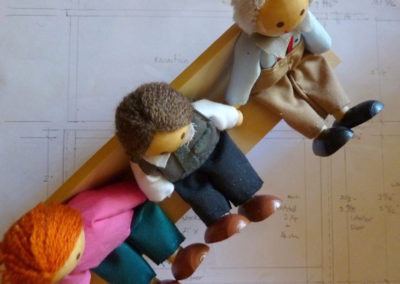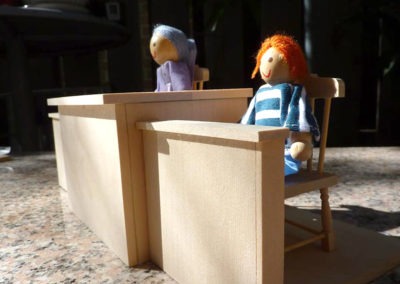Expert Testimony & Court Services
Pasadena, CA
Call Today: (626) 765-9944
EXPERT TESTIMONY & COURT SERVICES
The role of the expert witness is forever changing because the judicial system—not unlike the mental health field—continues to evolve and grow in an effort to meet the needs of the public. In civil, criminal, and family law, where the mental health of an individual or the impact of a life event on an individual party is raised, psychotherapists are increasingly being called upon to offer expert testimony in an effort to inform the court on matters relevant to the current litigation. Since this falls outside the scope of practice for most attorneys, it is becoming more common for attorneys and psychotherapists to work collaboratively within the legal domain.
Serving as an expert witness is a complex matter for psychotherapists—and it is not one to be taken lightly. Thus, it is important for attorneys to trust that their expert witness has the knowledge, experience, and capacity to tolerate a grueling cross-examination, without becoming flustered or emotionally dysregulated when opposing counsel may attempt to discredit or diminish their expertise in an open setting.
I am an expert in both the experience of psychological trauma, as well as children (with specialized training in working with the 0-5 population). Unlike many psychotherapists, who prefer to avoid entering the courtroom altogether, I thrive in this area. With both a clinical and research background, one of my strengths is the ability to break down complex clinical concepts into simple, yet compelling language, which non-clinicians, can easily understand.

“Assign yourself; be the catalyst for change.”
-Bren M. Chasse, LMFT
Case Review, Comprehensive Psychosocial Assessment, and Assessment Reports:
Under some circumstances, attorneys may request that a client be evaluated to determine their current level of psychosocial functioning, the clinical impact of a trauma or loss experienced, or to assess their ability to effectively advocate for themselves in stressful situations. In such cases, I provide a case review based on available forensic documentation and collateral reports. Additionally, I conduct a comprehensive psychosocial and diagnostic assessment of the client, and provide a complete assessment report for the attorney’s use within ten business days from the last date of client contact.
Expert Witness Testimony and Experience:
One important role of any effective child and family therapist is the ability to advocate for children—and I am passionate about this role. I have extensive experience providing expert testimony in family court, advocating for the best interest of minor children of all ages. I also have experience testifying in high-profile cases and am sensitive to the unique challenges inherent in such cases. I have more than a decade of experience working with court-involved families and working collaboratively with the Department of Child and Family Services (DCFS) in an effort to ensure that the interests of children affected by divorce, high conflict, violence, abuse, neglect, and trauma, are not lost in the legal shuffle. I have a comprehensive understanding of the family court system and am consistently successful in supporting children and families through difficult cases and family reunification efforts.
In addition to my work as a trauma expert, I can provide valuable expert testimony in both civil and personal injury cases. Some of these cases include, but are not limited to, cases involving sexual harassment in the workplace, discrimination and a hostile work environment, assault by a medical professional, as well as car accidents, and animal-related injuries.
Why is it so important for legal professionals to collaborate with psychotherapists with expertise in working with court-involved families?
When it comes to making decisions about what is in the best interest of a child, it can be difficult for all professionals involved to zealously represent the best interests of their client, and also remain fully child-centered. Therapists, particularly with expert knowledge and experience in working with minor children, bring a unique perspective to the courtroom. My role as an expert witness is, not only to advocate in the best interest of the child, but to do so with thought to the clinical implications of the current proceedings on the child. As a clinical expert, I am able to provide insight into the experience of the child, bring light to any active clinical concerns, and address the potential clinical impact of the different outcomes the court may be considering.
The double-bind for court-involved minors:
Although family courts are currently moving toward allowing teens and tweens to share their custodial preferences with the court, this is a dangerous proposition for minor children—one that can have devastating and lifelong consequences.
Allowing a child to testify in court places the child in a complicated double-bind. First, it places the burden on the child to choose between their two parents. Even absent overt pressure from either parent, a child may feel a sense of loyalty to one parent or may feel a responsibility to choose the parent they feel needs them the most (typically the parent most visibly devastated by the proceedings). Additionally, it places the burden on a child to make a choice that, developmentally, they do not have the capacity to make. Research has shown that the human brain continues to develop well into an individual’s mid 20’s. A minor child does not have the capacity to make a decision regarding custody or living arrangements and simultaneously consider the possible consequences for their choice, such as a rupture in their relationship or permanent split with the unselected parent.
While allowing a minor child to testify in court may come with the best of judicial intentions, allowing a child to testify in court continues to place the child in an adult role, which likely perpetuates as already existing issue between the parents and further serves to disempower the child. Involving an expert in the courtroom removes the child from the middle of the parental conflict and appropriately empowers the child by freeing them to assume their authentic role, which is that of a child.
When minors testifying in court cannot be avoided:
In spite of everyone’s very best efforts, there are circumstances wherein the testimony of a minor in open court simply cannot be avoided. In these cases, I work with children to prepare them for the experience of testifying and managing cross-examination from opposing counsel. Court can be a scary experience—even for adults—who are far more equipped to understand and not personalize the experience of court involvement. Children, particularly those with a trauma history, can become paralyzed with fear and highly triggered by the experience if not adequately prepared as to what they may encounter in the courtroom. In such cases, therapy focused on reducing a child’s fear, anxiety, and fantasies concerning the demands placed upon them can be highly effective, allow them to testify from a place of authenticity, and empower them to use their voice in such a way that, in many cases, they have been stripped of in the past.




